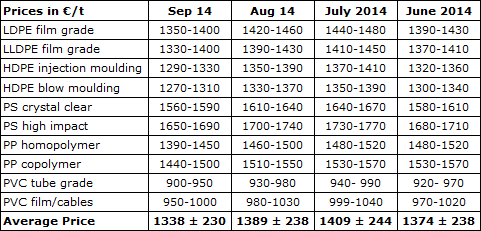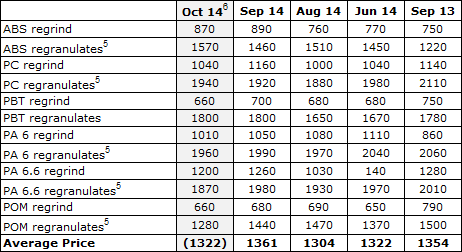Market Report Plastics - October 2014
Information about the market for plastics is being presented by:
bvse - Bundesverband Sekundärrohstoffe und Entsorgung e.V.
1. The market for primary plastics
After three successful quarters, the final economic quarter of 2014 has been difficult to date. For instance, the German economic news shows the economy to be weaker than has been predicted until now, see www.faz.net. Only a few days ago, the leading economic research institutes lowered the economic preview figures in their autumn survey. They are expecting a 1.3% growth rate for this year. In April they were still reckoning with a 1.9 % growth rate. The leading economists lowered the preview figures for 2015 from 2.0% to 1.2 %.
The German Association for Plastics Packagings and Films (IK Insdustrievereiningung Kunststoffverpackungen e.V.) predicts that the further economic development for the fourth quarter of 2014, see www.kunststoffverpackungen.de , will be restrained. Thus 40% of the companies surveyed assess the overall economic situation as being favourable. However, the preview of their own turnover development has fallen significantly. In the first quarter only 4% of the companies expected turnover to decline - as opposed to almost 30% in the fourth quarter of 2014. In addition, the turnover index has sunk for the fourth time in succession. The situation is nearly identical with respect to the export preview.
Standard plastics: Price decline in standard plastics: In September standard plastics prices fell significantly, see Table 1. The average prices sank by 51 €/t compared to the previous month. PE plastics prices fell by 58 €/t, PS by 50 €/t, PP by 58 €/t and PVC by 30 €/t. Packaging PET, too, which is quoted at an average 1250 €/t, has fallen once again by 20 €/t compared to the previous month. The price fall is explained by low demand on the processors’ part and by the considerable decline in precursor prices.
Table 1: EUWID quotes for standard plastics over the past four months; prices in €/t.

2. The market for secondary plastics
In September standard plastics in the primary markets were quoted at considerably lower prices. According to EUWID, plastics prices in the secondary markets were stable to slightly rising, while those indicated by plasticker had fallen. In September, there was considerable demand for plastics in all parts of the secondary market. Recyclate sales were satisfactory. However, plastics recyclers are still looking for a sufficient quantity of processing goods at adequate quality. Plastics recyclers have the impression that the processing quantities available in Germany have been declining significantly. The reasons mentioned include low sorting quantities, poor sorting quality, a high proportion of incineration and rising exports. In Germany, high-quality processing goods can now only be purchased based on significant price rises. In particular, it has become difficult to get hold of hard plastics in the German markets.
High-quality film from Italy, France, the UK and Germany is mainly selling in the export trade with the Far East. The weak euro is reducing the costs of plastics purchases from the Far East, which are pegged to the dollar. The high prices attained in exports often cannot compete with those achieved in the domestic markets. To put it differently: large quantities of waste plastics are now, once again, being exported to the Far East. However, traders are frequently complaining about the quality grades of the goods exported.
2.1 EUWID Price Watch
The EUWID Price Watch for waste plastics indicated average price rises by 13 €/t for post-user PE in September. The prices of select post-industrial PE, PP and PVC grades rose to a considerably lower extent. Film continues to be in good demand.
The quote for post-industrial PE has risen by 13 €/t, LDPE film mixed colours (K 49) is quoted at 250-370 €/t and LDPE film natural (K 40) at 520-640 €/t. The following prices are now listed for post-user PE: LDPE shrink film natural (E 40) 530-600 €/t, LDPE-shrink film mixed colours (E 49) 250-350 €/t, film transparent natural <70 m 440-490 €/t, film transparent mixed colours <70 m 80-210 €/t, mixed film (90/10) 285-325 €/t, mixed film (80/20) 270-290 €/t, HDPE hollow bodies mixed colours (C 29) 200-330 €/t, HDPE regrind from crates, colour-separated 680-900 €/t und HDPE regrind from crates, mixed colours 600-680 €/t.
Post-industrial PP prices have risen by an average 5 €/t: film mixed colours (K 59) 130-250 €/t and film natural (K 50) 330-480 €/t. There is some development in post-industrial PVC, the prices of which have increased by an average 5 €/t: PVC_P transparent 400-500 €/t, PVC mixed colours 320-450 €/t.
Even though the September PET market, too, was calm in terms of price listing, the PET quantities available were under pressure because beverage bottles were re-directed towards the export trade and beverage bottle quantities have been in decline since the end of the summer break. Quantities are being balanced out based on beverage bottle purchases on the European domestic markets. According to some reports there are also sufficient stocks including processing goods. There is satisfactory demand for PET recyclates. The EUWID quotes for beverage bottle PET have held their own at: PET transparent 250-290 €/t and PET coloured 60-95 €/t.
2.2 plasticker price index
The plasticker internet platform publishes quotes on an hourly basis. However, the present market report indicates the final monthly prices. The preliminary quotes previously accumulated are only represented during the reporting month in question, in this case for October 2014 - these quotes thus merely reflect an interim situation that does not become definitive until the following month. Plasticker offers the quality grades regrind and regranulates both as virgin materials and as secondary goods. The term “bale goods“ refers to waste plastics only.
Standard plastics
In September the average standard plastics price, see Table 3, was 598 €/t, i.e. it fell short of that quoted in the previous month by 17 €/t. There were, in part, significant price changes in the individual quality grades. For instance, price rises ranged from 20 €/t to 90 €/t and price falls from 10 €/t to 120 €/t. In September there was extraordinarily high demand for standard plastics. HDPE regrind shows a consistent upward trend, while HDPE regranulate prices have been significantly declining for two months. PP regranulates have shown a marked downward trend over the year. PS regrind prices have been rising over the year. In September, too, PET regrind was quoted at very low prices, while bale goods reached their annual record high up to that point. According to plasticker, the September price listings changed by more than +/- 40 €/t compared to the previous month for: HDPE regranulates – 60 €/t, LDPE regrind – 90 €/t, LDPE regranulates – 80 €/t, PP bale goods – 120 €/t, PS regrind + 70 €/t, PS regranulates – 90 €/t, PVC_P regrind + 90 €/t and PET bale goods + 50 €/t.
The first preview of the October quotes, which cannot be finally listed until the beginning of November, shows the prospective average price to be 604 €/t. Thus the plasticker internet platform indicated a slight price rise by 6 €/t on 15 October 2014. To date, there has been considerable demand for standard plastics in October.
Table 2: Prices of standard plastics in plasticker, quoted in €/t

*: Supply figures too low to attain statistical significance; 1: equivalent to the grade “post-industrial, mixed colours”; 2: equivalent to K49; 3: equivalent to K59; 4: equivalent to “standard, mixed colours”; 5: equivalent to the grade “regranulates, black”, 6: forecast (may be amended by additional quotes)
Technical plastics
In September the average technical plastics price increased by 57 €/t compared to the previous month, see Table 3. The following prices changed with respect to the individual quality grades: for instance, there were price rises by 20 €/t to 160 €/t and price falls by 10 €/t to 50 €/t. PC regrind, PC regranulates, PA 6 regrind, PA 6.6 regranulates and POM regrind have shown a tendency towards decline over the year. In September technical plastics were in good demand. According to plasticker the following price listings changed by more than +/- 70 €/t in August: ABS regrind + 130 €/t, PC regrind + 160 €/t, PBT regranulates + 150 €/t and PA 6.6 regrind + 130 €/t.
The first preview of the October quotes, which cannot be finally reported until the beginning of November, shows the average price to be 1322 €/t. Thus, technical plastics have declined again after having attained an interim high in September. In October there has been restrained demand for technical plastics to date.
Table 3: Prices of technical plastics in plasticker, quoted in €/t

5: equivalent to the grade "regranulates, black". 6 forecast (likely to be amended by additional quotes)
No guarantee for any of the prices. All EUWID prices are quoted ex works. As a rule, the prices quoted refer to quantities in excess of 20 tons. The monthly quotes for secondary plastics, which are updated on an hourly basis, can be calculated using the price lists that are derived from the quotations published in the raw material exchange plasticker. The prices listed in this index are quoted with reservation - as the majority of the quotes submitted are not necessarily equivalent to the sales prices. Furthermore, plasticker does not distinguish between the following grades: transparent, mixed colours or colour-separated. Therefore, the information provided by plasticker may indicate different market behaviour than the prices quoted by EUWID. Plasticker offers the quality grades regrind and regranulates in the form of both virgin materials and secondary materials.






